Latest News
A Nation of Entrepreneurial Journeys
Posted by on June 4, 2013 at 11:34 AM EDT
Victoria Ransom is being honored as a Champion of Change for her accomplishments as an immigrant entrepreneur and innovator.
Growing up on an asparagus farm in rural New Zealand, I never dreamt I’d one day come to the United States and build a company like Wildfire. I certainly never imagined I’d one day be honored by the White House.
My transformation into an entrepreneur started with my scholarship to attend an international school in New Mexico at the age of 17. This led to me staying in the U.S. for college and then taking a job where I was exposed to a number of entrepreneurs looking for financing. Thanks to this experience, I saw people around me taking chances, making mistakes and learning from them, and being respected for it! The U.S. culture of encouraging innovation, big thinking, and risk-taking, and respecting people for trying even if they fail, inspired me to embark on my own entrepreneurial journey.
I was joined in this entrepreneurial adventure by my then-partner (now husband), Alain Chuard, who had also come to the U.S. for college. Alain’s from a family of Swiss entrepreneurs, and we both saw a place where people with good ideas and a strong work ethic could win. We wanted to build a business here, but our visas did not allow for this, so we returned to New Zealand to start what turned out to be a successful adventure travel company, Access Trips.
In 2007, we returned to America to deepen our education. Alain enrolled at Stanford Business School and I set off for Harvard. During graduate school, we launched a marketing software company called Wildfire. You could say we were lucky to be in the right place at the right time, but we worked very hard to build relationships with Silicon Valley’s great network of innovative people. We met with venture capitalists, and we studied the great technological advancements happening at companies like Facebook, Twitter, and Google. By the time we finished graduate school, Wildfire had enough success for us to stay in the U.S. on visas available to entrepreneurs.
Last summer, we celebrated the sale of Wildfire to Google. I’ll never forget the moment I looked around the room and shared the news with more than 400 employees, each of whom had worked tirelessly to make the sale possible. It was one of the most emotional moments of my life. Indeed, I think everyone, whatever their background, can relate to how incredible it feels working toward a common goal with a group of people you love. Building Wildfire was like being part of a great family, and the team was a huge part of what has made this whole process so gratifying.
When a company like Wildfire succeeds, the impact reaches far beyond the founders. We created jobs that 400 people loved. We gave new college graduates skills and inspiration they’ll take with them for the rest of their careers. We shared incredible moments, celebrating scores of marriages and welcoming numerous Wildfire babies. Then I think of all our employees’ families—the parents, partners, and children—who proudly watched their loved ones succeed.
Wildfire’s success gave back to the American people too. Aside from the jobs we created, our sale generated significant tax revenue. Wildfire’s success is also paying back the university endowments, pension funds, state entities, and church groups that were investors in the venture capital fund that supported Wildfire. I see what we’ve done to help our customers as well, tens of thousands of whom have used Wildfire’s software to build their own businesses and create jobs.
Finally, I think of the impact that successful companies like Wildfire have on those who watch from the outside—those who become inspired to tackle their dreams and to re-create this cycle all over again. Alain and I spend a lot of time sharing what we’ve learned with these people, including female business owners and youth and foreign entrepreneurs. We want to encourage more successful, innovative foreigners to come to the U.S., and we’re working to connect them with other foreigners who have already built businesses here.
In the end, my story is not so different from other modern-day achievers of the American Dream. We all ended up here and saw something special that made us believe we could take the leap and do something great. Let’s continue to make the U.S. a “can-do country” where innovators come to stay and change the world.
Victoria Ransom is a Founder of Wildfire.
Learn more about InnovationsThere Has Never Been a Better Time to Start a Company
Posted by on June 4, 2013 at 11:22 AM EDT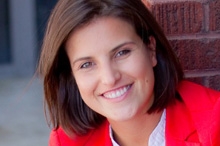
Anna Mongayt is being honored as a Champion of Change for her accomplishments as an immigrant entrepreneur and innovator.
Entrepreneurs are at the heart of many efforts to solve the world’s most pressing problems—and every entrepreneur truly believes they are capable of fundamentally changing the world for the better. No country in the world has been more supportive of the risk-taking inherent in the creation of new ventures than the United States. Between the abundance of equity capital, reliable laws, courts, and a culture that believes in rewarding big risks, there has been no better place to start a business than right here in the United States.
This entrepreneurial zeal has special meaning to me personally. I came to the United States from the Soviet Union at the age of 12. Having seen first-hand what a communist society does to personal ambition, I fully believe in the American Dream. While most of my friends pursued careers in accounting and finance upon graduation, I was determined to carve my own path and to build my own business—but like many other recent graduates, I struggled (big time).
Unfortunately, I fear we are no longer doing enough to attract our most talented minds to take a chance on themselves and build something new. Despite the nearly constant political conversation about the importance of encouraging more people to create jobs, our recent graduates are not following that path. While 54% of college graduates say they want to start their own company, the vast majority don’t. Burdened by student loans, comforted by traditional career options, or just not sure how to get started, many are choosing the “safe career path.”
Certainly, the roller coaster ride of starting a new business is not for everyone. It is a labor of love and your heart must be in it—not for the quick riches glamorized in the media, but for the lasting impact you can have on the world. However, I strongly believe that there has never been a better time to start a company. The cost of launching a business continues to decrease. Ten years ago, the cost of a customer running a basic Internet application was $150,000 a month. Running the same application today in Amazon's cloud costs about $1,500 a month, and the Internet has leveled the playing field so that very small players can reach millions of people as easily as the biggest companies in the world. With lower startup costs and a vastly expanded market, companies today can reach unprecedented scale with minimal investment.
At Upstart, our mission is to help people realize their personal potential. We believe young people need two things to make the leap into the uncertain world of entrepreneurship: funding and mentorship. We’ve created a platform that enables young people to raise money from backers who believe in their aspirations, for a portion of their future income. Investors can opt-in to become mentors and earn a return based on a regression model that predicts an individual's income over ten years. While our offering is not exclusive to entrepreneurs, this investment vehicle uniquely supports the lifecycle of an entrepreneur.
Entrepreneurs often struggle to make ends meet while investing their precious time in building their business. Then as things go well, they can see outsized rewards. By tying their payments to their income, we make sure their obligation is never too daunting. And while businesses may (and more than 60% do) fail, bright, ambitious individuals succeed over time. Upstart is a way for aspiring entrepreneurs to take some of the income they would have earned on the “safe career path” and use it to mitigate their financial risk on the “path less traveled.” Through one lens, Upstart is a way for aspiring twenty-somethings to raise capital and find mentors that can help them pursue their dreams. Through another, we are creating a whole new flavor of risk capital waiting to fuel the next generation of entrepreneurs that our economy so desperately needs.
Anna Mongayt is Co-Founder of Upstart.
Learn more about InnovationsFrom East Berlin to the Innovation Capital of the World
Posted by on June 4, 2013 at 11:03 AM EDT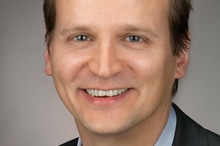
Jonas Korlach is being honored as a Champion of Change for his accomplishments as an immigrant entrepreneur and innovator.
In 1989, at age 16, I walked with my grandmother through the Berlin Wall at the Brandenburg Gate just after it was opened. The sense of freedom and possibility seemed limitless for the first time in my life. While I stayed in my home in East Berlin for a few more years to finish school, earning my B.A. and then M.S. degrees in Biological Sciences from Berlin’s Humboldt University, my interest in developing new methods and technologies for genetic research ultimately drew me to the United States.
The United States is seen around the world as a place where big ideas are welcome, and encouraged. The nation’s academic institutions and government investment in basic research are esteemed across the globe. Coupled with the enterprising drive found in this country, the U.S. is perhaps the most encouraging environment in the world for inventors, innovators, and entrepreneurs.
Ultimately, I was drawn here by the caliber of research within the nation’s university system. After participating in a high school exchange program and a few summer internships, I moved to America in 1997 as a graduate student in Cornell University’s molecular biology Ph.D. program. It was in Ithaca where I met a physics graduate student, Stephen Turner, who was interested in solving the same challenge as I was—how to observe individual enzyme molecules that synthesize DNA, the genetic blueprint of life, in real time. In collaboration with our advisors, we invented a revolutionary DNA sequencing technology, the first in the world capable of capturing real-time movies of the behavior of these minute single molecules, reading the order, or sequence, of the building blocks of DNA in the process.
With the help of many people, the current commercial product of our invention, the PacBio RS II, is a machine that is advancing the understanding of infectious disease, microbiology, agriculture, and complex genetic diseases. Based on the Single Molecule, Real-Time (SMRT) Sequencing technology we invented at Cornell, the product is the capstone of a publicly traded company that now employs nearly 300 people in the U.S. Appropriately based in Silicon Valley, our company employs a wide range of highly specialized scientists and engineers from disciplines including molecular biology, enzymology, surface chemistry, bioinformatics, nanofabrication, and optics, alongside marketing, sales, manufacturing and other staff to support our R&D and commercial operations.
Remaining here hasn’t been without its obstacles—obstacles that many of today’s foreign-born science, technology, engineering, and mathematics (STEM) graduates must overcome. I was fortunate enough to have the support of a U.S. Congresswoman who spoke up on my behalf to help me secure a temporary residency visa in 2004. But what happens to all of the bright foreign students who are not as lucky as I was? Currently, the U.S. is short on so many native-born graduate students pursuing STEM degrees that by 2018, the country is projected to have 230,000 jobs requiring graduate-level STEM training that it will not be able to fill with native-born workers. Encouraging high-skilled workers from around the world to fill these gaps not only helps them realize their dreams, but also helps support the U.S. economy and the nation’s interests in being the innovation capital of the world.
When the Berlin Wall came down, I felt like anything was possible. But it was only here in the United States where those dreams became reality. Since arriving in 1997, I have earned my Ph.D., been granted 33 U.S. patents, and helped build a company that is on the cutting edge of genetic research. In 2011, I was honored to be present as the PacBio RS was installed in a top research institution in Germany, an event that drew the attendance of VIP guest Chancellor Angela Merkel. I stood next to her, an East German herself and a physicist by training, as she insisted on being the first person to start the machine. It was a historic moment in Germany that was in part made possible by a historic moment 22 years before, when a wall came down and opened the possibilities for me to participate in the American Dream. Today I am immensely grateful for the opportunities I have been given in this country, and to be honored as a Champion of Change.
Jonas Korlach is Chief Scientific Officer of Pacific BioSciences.
Learn more about InnovationsCollaboration, Community, and a Childhood Dream Fulfilled
Posted by on June 4, 2013 at 10:51 AM EDT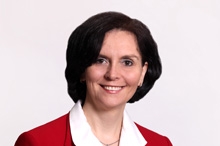
Olga Koper is being honored as a Champion of Change for her accomplishments as an immigrant entrepreneur and innovator.
I am a woman who appreciates and enjoys the benefits and challenges of being an innovator and entrepreneur in the United States. Throughout my career, I have been very fortunate to be involved in projects dealing with more efficient energy generation and storage, decontamination, sustainable materials, water clean-up, and even in-vitro cancer detection and treatment using the power of nanotechnology.
At the same time, I am a mother who cares about the safety and welfare of not only my family, but also other people around the world, and I have the perfect job that allows me to enhance that very safety and welfare. It is a privilege to work for Battelle Memorial Institute, the largest not-for-profit research organization in the world, and a company doing business according to the founding principle of Gordon Battelle: to conduct research for the betterment of humankind. We are a business of innovation that is not only involved in developing technologies and solutions, but is also focused on promoting science, technology, engineering, and math (STEM) education.
Being born in Poland during the era of communism and growing up in such an environment shaped me to do more with less, grab opportunities, and collaborate with others. I found I could reach my goals much faster and strengthen my own efforts while impacting the broader society. When I came to the U.S. to work as a research assistant at Kansas State University (KSU), I planned to be here for only one year. However, due to the opportunities that this country offers, the camaraderie of the people here, and the numerous ways that one can be involved in promoting STEM education, that one year became more than twenty. One of the most important factors in why this country is so successful is the openness to collaboration between small and large industry, academia, national laboratories, and government. My passion is to solve scientific problems and provide innovative solutions to clients by establishing multi-organizational and multi-disciplinary teams that provide “out-of-the-box” thinking.
When I graduated from KSU, my professor asked if I wanted to be the first employee at his startup company based on the nanomaterials research that we were conducting in his group. Where else would you get such an opportunity and follow your childhood dreams of being involved in developing products that can be used by everyone? With the support of the government, initially through programs such as Small Business Innovation Research (SBIR), we developed and commercialized technologies that made our warfighters safer, provided environmental benefits, and at the same time created new jobs and brought more than $30 million to the community. In addition, we provided work experience to numerous students and were involved in bringing science—particularly nanotechnology—to local schools, encouraging future generations of innovators and entrepreneurs.
One of the greatest experiences of my professional career was participation in Pipeline, an entrepreneurial fellowship program that originated in Kansas. Pipeline’s approach to developing high-growth entrepreneurs places the emphasis on growing the leader of these challenging companies, in contrast to other programs that focus on specific business ventures. It was in Pipeline that I was completely immersed in an entire community of ambitious entrepreneurs who also shared the drive to change the world and their communities. I have been so pleased to see Pipeline expand across the Midwest, thanks in part to the Ewing Marion Kauffman Foundation. This community of high-growth entrepreneurs, after their initial year as Fellows, is staying involved in Pipeline as investors, mentors, and advocates for entrepreneurship in the United States. As an immigrant entrepreneur and innovator, I can say without a doubt that it is critical to have a “family” like Pipeline to support and connect all of us pursuing these goals together. We share a vision for our lives and our work, and it has been a privilege to stay so connected over the years, no matter where my professional life has taken me.
I am truly honored to be chosen as a Champion of Change and I am excited to meet and learn more about the great work and contributions of the other honorees. I hope that all our children will have a chance to follow their dreams, as I did, in the country that was created by immigrants and continues to welcome them.
Olga Koper is a research scientist at Battelle Memorial Institute.
Learn more about InnovationsBuilding Wealth in Immigrant Communities
Posted by on June 4, 2013 at 10:02 AM EDT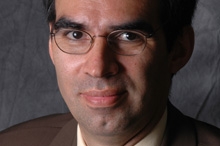
John Herrera is being honored as a Champion of Change for his accomplishments as an immigrant entrepreneur and innovator.
I am honored to be named a White House Champion of Change. I am an immigrant from Costa Rica and like so many people around the world, I have always admired the spirit of Americans. I also know from experience that Latinos possess a strong entrepreneurial spirit. So, when I become a U.S. citizen on July 4, 1999, I felt it was my civic duty to help other immigrant families succeed and to help further strengthen this great country.
My work to foster entrepreneurship and greater economic opportunity for Latino families in North Carolina dates to the mid-1990s. While at the Duke Center for International Studies, I observed first-hand the rapid growth of the immigrant population in North Carolina, especially among working-class, low-income Latinos. This new and largely unbanked population experienced cultural and language barriers to accessing financial services. Most mainstream financial institutions did not view Latino immigrants as promising potential clients due to lack of credit history and low account balances. This fed a reliance on cash that resulted in increased crime against Latinos, as they were viewed as “walking banks.” I began looking for a grassroots response to the problem, gathering state and local leaders, community advocates, and the credit union community.
The outcome of these collaborations was the creation of the Latino Community Credit Union (LCCU), a full service, bilingual financial institution. Starting with one branch in Durham, LCCU has become a trusted and safe place for Latinos to save money, access affordable credit, buy homes, start businesses, and build wealth for the future. We provide a full range of affordable and innovative products and services typically unavailable to low-income immigrants, such as bilingual staff, deposit and transaction accounts, loans, remittance services to Latin America, and a comprehensive financial literacy program.
The need for our services has been demonstrated by our growth. LCCU is now the largest Latino-focused credit union in the country with 55,000 member-owners and ten branches across North Carolina. We positively impact individuals and families and help create safer and more economically stable communities—a recent University of Virginia Darden School of Business study attributed a 3.8% increase in property taxes, a 4.2% overall decrease in crime, and the appreciation of $9.8 billion in taxable real estate value to the presence of LCCU branches. With LCCU’s proven record of maintaining very low delinquency rates as compared to its peers, we have become a national model for financial institutions seeking to serve unbanked, immigrant communities. Now we have begun serving immigrants and refugees from more countries, such as Myanmar, Bhutan, and Kenya, who encounter similar issues integrating into the U.S. financial system.
In my role as Vice President of Latino/Hispanic Affairs for the Center for Community Self-Help, I am well situated to explore new financial strategies to help low income families become more financially stable. Self-Help is a family of nonprofit organizations whose mission is to create and protect ownership and economic opportunity for all, and is one of the largest Community Development Financial Institutions (CDFIs) in the country. Self-Help is a highly successful innovator, and our entrepreneurial culture has continued to inspire me to push LCCU to greater heights. My passion is to positively engage with people in all walks of life so that we can better understand and help each other.
In addition to my work at LCCU and Self-Help, I served for two terms on the Town of Carrboro’s Board of Aldermen, and I was the first immigrant to win a municipal election in North Carolina. I also helped found El Pueblo, Inc., a statewide Latino policy organization; El Centro Latino, a community-based organization; and the National Association for Latino Community Asset Builders, a coalition of over 90 organizations operating in 32 states to help build community assets and family wealth in immigrant communities. I also am forever grateful for the superb education I’ve received here—an M.S. from North Carolina State University and a B.S. from the University of Delaware.
My parents taught me that we need to help others with whatever talents God gave us. I think my talent lies in my desire to help people and to bring people together to figure out how to effect meaningful change. As a naturalized U.S. citizen, I am proud of both my heritage and my U.S. citizenship as I work to help effect positive change that helps all of our families and communities.
John Herrera is Co-Founder of the Latino Community Credit Union.
Learn more about InnovationsEmpowering People Worldwide to Fight Counterfeit Drugs
Posted by on June 4, 2013 at 9:56 AM EDT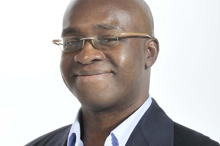
Ashifi Gogo is being honored as a Champion of Change for his accomplishments as an immigrant entrepreneur and innovator.
When you think about counterfeit products, what do you imagine? Do you envision fake Prada bags hanging in an open-air market, or poorly duplicated DVD knock-offs on a makeshift table in New York City? How about potentially harmful or fatal counterfeit drugs sold in pharmacies and on makeshift street carts? Many emerging markets, like my home country Ghana, face the latter issue every single day.
If you don a fake bag, you likely won’t get hurt or die from it, but consuming fake medication is a whole different story. Counterfeiters don’t abide by any quality standards, so taking a fake drug could mean consuming something made out of relatively harmless ingredients like starch or chalk—or worse, harmful ingredients like anti-freeze, heavy metals and brick dust. In both cases, the active ingredient could be in wrong doses or could not be present at all, rendering the drug purchased with hard-earned money essentially useless. With over 700,000 people dying every year from fake tuberculosis and antimalarial drugs alone—the equivalent of five fully packed jumbo jets crashing every day—the threat of counterfeit medicine is all too real.
Meanwhile, mobile technology in emerging markets is booming. Mobile phone subscriptions globally jumped from under one billion in 2000 to over six billion in 2012—five billion of which are in emerging markets. How could we take this positive trend and use it to address a serious global problem like drug counterfeiting?
While pursuing my Engineering Ph.D. at Dartmouth College, I developed technology that answered that question. Mobile Product Authentication allows consumers to use their mobile phone to verify that the products they are buying are the real deal. The solution is simple: before purchasing a product, a consumer will scratch off a part of a security label that will reveal a unique, one time use PIN that is texted to us for free. The consumer will then receive a reply stating that the product is genuine, fake, or even stolen.
In 2010, we piloted the solution in Nigeria with Merck KGaA’s in-market representative using the diabetes treatment drug Glucophage. The pilot was such a success that we have since expanded our operations to five countries across three continents. We now protect products across various industries, including automotive, electrical goods, and textiles and clothing.
By empowering people to fight for their basic right to be safe from dangerous products like fake medicine, we can help foster positive change in the world. We can see statistics on unnecessary deaths from counterfeit products dwindle, ideally to zero.
I often think about how we took a positive trend in mobile technology and used it to develop a solution that saves lives, and I reflect on how we could apply that logic to address issues in our community and in our world. What positive trends do you see around you? How can you use those trends as fuel to give back to your community, to your country, to the world? How can you take an everyday object like a mobile phone and turn it into a weapon of mass construction? Sometimes the solution to problems is as simple as reaching into your pocket.
Ashifi Gogo is CEO of Sproxil, Inc.
Learn more about InnovationsTransforming the World Through Software
Posted by on June 4, 2013 at 9:49 AM EDT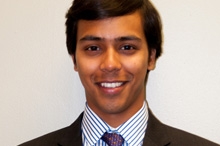
Riddhiman Das is being honored as a Champion of Change for his accomplishments as an immigrant entrepreneur and innovator.
I was born and raised in a town of about a million people at the foothills of the Himalayan Mountains in India. I first used a computer when I was seven years old, and I realized that humankind was about to be transformed by the Information Technology revolution—and that software was going to change a lot about how we had been doing things for the past few millennia. I knew I wanted to play a part in this revolution, and I decided that I was going to one day be a computer scientist and do my bit to help people use technology in their lives.
My father was born in a remote village a few hundred miles away, worked his way through school, and eventually trained to be a hematologist at the University of Cambridge. He was a living inspiration of what hard work and perseverance could achieve. He had always encouraged me to come to the United States to pursue my dream, since here is where most of the innovation in software happened. When he died when I was 14, my mother, a rheumatologist, stepped up, and with the help and guidance of a few family and close friends, I got into an American college and came over to pursue my goal of transforming the world through software.
During my college years, I got acquainted with the Kansas City technology entrepreneurship community, and I knew I could make a difference through my skills here. I co-founded my first company, Dr. Peet’s Software, with the goal of developing mobile software that would help children and young adults with developmental disabilities learn basic literacy skills. About a year later, I started Talent Helix, a company whose mission was to use social networks to help people find opportunities. The grand vision of Talent Helix was that college students and under-employed people in the community would use the service to find jobs and part time gigs while working full time or being a student. While Talent Helix never gained much traction, the experience taught me a lot about entrepreneurship, and more importantly, about Kansas City’s high-tech entrepreneurial community. I realized that while this community had its strengths, it also had a few major weaknesses. One such weakness was an acute shortage of tech talent, and I started thinking about ways I could contribute to solving that problem.
With this in mind, I went on to intern, and later work remotely part-time, at a few companies in California and New York City, where the best and the brightest tech talent always seemed to go. While there, I observed first-hand the processes and workings of several successful tech companies, both big and small. These jobs and internships gave me an opportunity to work on cutting edge technologies that led to my filing of three patents, and learn from the people who write some of the most popular software programs we use every day.
After a very rewarding year of doing this, I felt it was time to see if I could use these experiences to make a difference in the Kansas City tech community—and so I started Galleon Labs, a software consulting company that would handle the technical needs of any tech venture in the city, and hopefully eventually the entire Midwestern region. In just over 13 months of existence, we’ve developed the core products of over 21 different companies from the region. We’ve developed software to improve and maintain pharmaceutical drug adherence, web and mobile applications for pediatricians to keep track of patients away from the clinic, and computer vision applications for digital agencies to measure the effectiveness of their ad campaigns, among many other very interesting and challenging projects. My proudest moment was being able to hire one of my fellow graduates and one of my favorite professors from college.
Lately, I've also been heavily involved with EyeVerify, where we’ve commercialized a software-only, biometric method for verifying the identity of mobile users called 'Eyeprints.' The Eyeprint Verification System is based on the unique vein patterns in the whites of your eyes, and has fingerprint-level accuracy. Eyeprints require only the existing camera in a smartphone, so the system is not dependent on expensive fingerprint or iris scanning hardware. The patented technology is a major advancement in biometric authentication and is the only approach that uses built-in cameras within mobile devices to image and pattern-match the unique veins in the whites of users’ eyes, ensuring highly accurate, fast, and convenient security.
I often think of how different my journey would have been if I did not have to struggle with immigration laws. After I graduated college, I was planning on working for a major software company, but couldn't because my work authorization was denied for a very minor typographical error in the paperwork. As a result, in order to continue to be in the country, I had to exit the country and pursue my entrepreneurial and technical activities while also attending graduate school in the U.S. The United States has been at the forefront of technological and entrepreneurial innovation for decades, and it is my most earnest hope that legislators realize the immense value that highly-skilled immigrants bring into the country, so that the United States can remain in that spot for many years to come.
Riddhiman Das is Founder of Galleon Labs.
Learn more about InnovationsImproving Lives in the Land of Opportunity
Posted by on June 4, 2013 at 9:41 AM EDT
Shradha Agarwal is being honored as a Champion of Change for her accomplishments as an immigrant entrepreneur and innovator.
I was born to hard-working and ambitious parents who started life with little more than an education and a desire to do well. Their goal in life was to provide opportunities for their children so that we could then go on to contribute to the world, without such basic worries as feeding our family or keeping a roof above our heads.
One other dream my mother saw for my brother and me was an American education. She saw it as a route to opportunities to fulfill our destiny and to make an impact on the world we live in. Growing up in India, education is a necessity, but not sufficient alone to make a healthy living so that one can afford the luxury of working towards impacting the world. She wanted us to arrive at the “Land of Opportunity,” where armed with a solid education, ambition, work ethic, and tenacity, one can truly participate in projects, initiatives, and organizations that are answering difficult questions and seeking solutions to world problems such as disease and hunger.
With this ambition in my genes, I arrived in Chicago on September 5, 2004, and enrolled in the journalism program at Northwestern University’s Medill School of Journalism. While on a scholarship to a United Nations high school in Singapore, United World College of South East Asia, I had identified my “calling-of-the-day” as bringing information to an audience to drive engagement and awareness. Having reported for a local news station during the mid-term elections of 2006, I quickly saw the impact of bringing all types of powerful data to the right audience at the right time and in the right place.
In 2006, my college friends and I had an idea—installing media screens in waiting areas of physician practices and showing videos about simple lifestyle changes that improve lives for those diagnosed with a chronic condition, such as diabetes. Now in its seventh year, ContextMedia has hired almost 50 employees and is generating millions of dollars in annual revenue.
Hiring and culture are very important aspects of running our own company. However, I often feel restricted in the talent we have access to—either for visa reasons or for retraining limitations. Additionally, access to capital has historically been a challenge in our growth. As an immigrant, I also worry about my own future in this country, given the uncertainty of a path to citizenship.
I am fortunate and grateful for the opportunities I have had in this society that truly believes in merit and each person’s potential to contribute, more than it focuses on color, religion, gender, or age. We live in an interesting economic time marked by the global recession, but by offering resources to entrepreneurs to build companies, create jobs, and contribute to the growth of the economy, recovery is possible. This country, more than most other European, African, or Asian countries, acknowledges and encourages entrepreneurship. While no country is perfect, the United States of America is a nation built on free enterprise, creative thinking, and risk-taking, which has allowed me to contribute back as an entrepreneur and investor. I look forward to continuing to expand and inspire others to follow their dreams and utilize the resources this country offers to build, grow, and give back.
Shradha Agarwal is Co-Founder of ContextMedia.
Learn more about Innovations
- &lsaquo previous
- …
- 79
- 80
- 81
- 82
- 83
- 84
- 85
- 86
- 87
- …
- next &rsaquo


Twitter